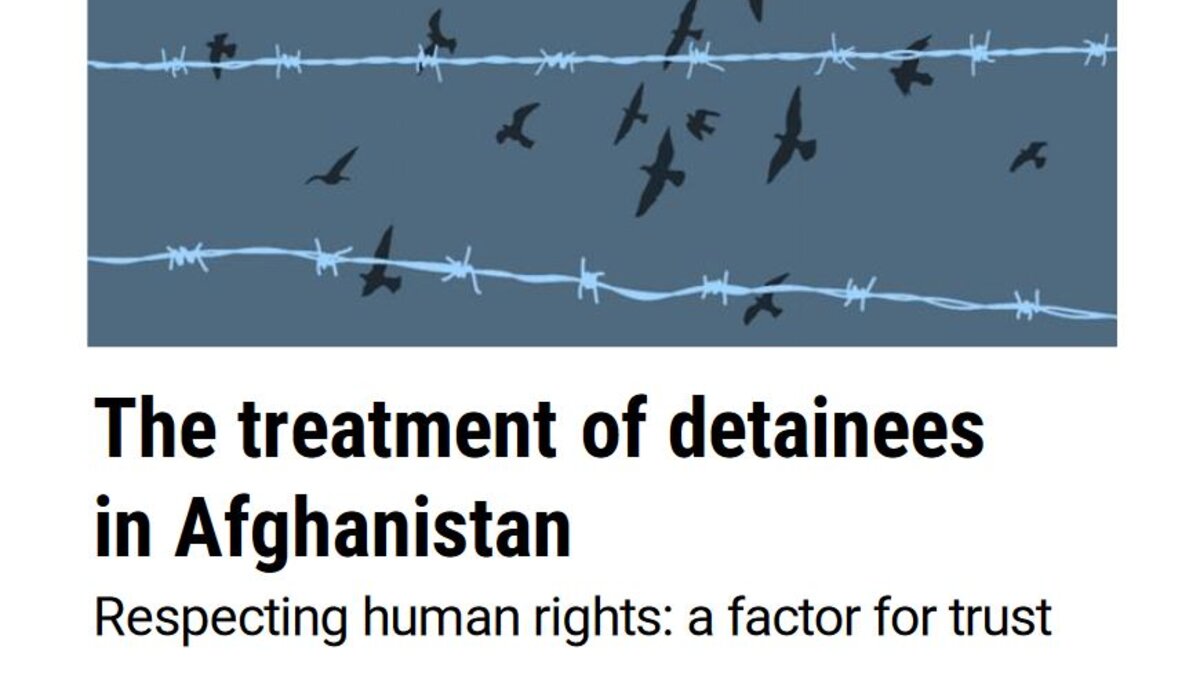UNAMA urges urgent, accelerated action by Afghanistan’s de facto authorities to stop torture and protect rights of detainees
GENEVA/KABUL - The UN Assistance Mission in Afghanistan (UNAMA) has documented over 1600 cases of human rights violations committed by Afghanistan’s de facto authorities during the arrest and subsequent detention of individuals, according to a new report released today.
The report by UNAMA’s Human Rights Service covers the period from 1 January 2022 to 31 July 2023, with cases documented across 29 of Afghanistan’s 34 provinces.
Nearly 50 per cent of these violations comprise acts of torture and other cruel, inhuman or degrading treatment. These occurred overwhelmingly throughout the process of arrest and custody in places of detention under the de facto Ministry of Interior (MOI), and de facto General Directorate of Intelligence (GDI). Rare instances were documented in prisons under the de facto Office of Prison Administration (OPA).
In attempts to extract confessions or other information, detainees were subjected to severe pain and suffering, through physical beatings, electric shocks, asphyxiation, stress positions and forced ingestion of water, as well as blind-folding and threats. Violations of due process guarantees, including denial of access to lawyers, are the norm.
These violations have occurred despite the issuance of directives from the de facto authorities aimed at better protecting human rights of detainees and regulating the conduct of security personnel.
These directives, including a code of conduct issued by the de facto authorities’ leader in January 2022 and similar ad hoc instructions, have not been sufficiently followed at the operational level, the report found.
The report highlights the urgent need for the professionalisation of the de facto security and prison authorities in a number of areas, including their capacity to conduct investigations.
“The personal accounts of beatings, electric shocks, water torture, and numerous other forms of cruel and degrading treatment, along with threats made against individuals and their families, are harrowing. Torture is forbidden in all circumstances,” said Volker Türk, the UN High Commissioner for Human Rights.
“This report suggests that torture is also used as a tool – in lieu of effective investigations. I urge all concerned de facto authorities to put in place concrete measures to halt these abuses and hold perpetrators accountable.”
“The prevalence of torture, coupled with the systemic violation of procedural safeguards in custody, such as lack of access to lawyers, must be comprehensively addressed by the de facto authorities.”
The de facto authorities must take steps to establish a stronger legal aid framework, and address blockages in the criminal justice process caused by high volumes of arbitrary arrests with no effective judicial oversight. Arbitrary and prolonged detention of individuals pending the completion of investigations exposes detainees to increased risk of abuse.
The report acknowledges steps taken to ensure stronger oversight of places of detention, including the continued work of the de facto MOI and de facto GDI Human Rights Directorates, de facto OPA’s monitoring committee, the de facto Supreme Court’s committees, as well as the creation of a new High Directorate of Supervision and Prosecution of Decrees and Edicts mandated to monitor places of detention and investigate allegations of abuse.
“Although there have been some encouraging signs in terms of leadership directives as well as an openness among many de facto officials to engage constructively with UNAMA, and allow visits to prisons, these documented cases highlight the need for urgent, accelerated action by all,” said Roza Otunbayeva, the Secretary-General’s Special Representative for Afghanistan and Head of UNAMA.
“There is a pressing need to consider more engagement with the de facto authorities to end these practices, and I hope the report and its recommendations are seized upon as a matter of priority. We remain committed to the people of Afghanistan and our efforts to maintain constructive engagement, with impartiality and in good faith.”
Afghanistan remains bound as a State Party by numerous international instruments on human rights and fundamental freedoms. UNAMA is mandated by the United Nations Security Council to promote and support the implementation of these obligations.
END
* UNAMA’s Human Rights Service, which also represents the Office of the UN High Commissioner for Human Rights, leads the Mission’s work in monitoring, reporting and advocating on the human rights situation in Afghanistan, as mandated by the UN Security Council.
 UN
UN







